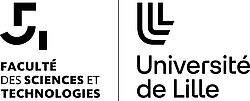la faculté des sciences et technologies
L'Université de Lille propose une nouvelle offre de formation à la rentrée 2026.
Elle s'est dotée d'un nouveau portail, plus intuitif et ergonomique, afin d'améliorer la lisibilité de l'offre de formation. L'ensemble de l'offre de formation sera progressivement mise à jour dans ce nouveau catalogue.
Retrouvez dès maintenant les licences, DEUST et BUT sur https://formation.univ-lille.fr/
Retrouvez nos licences et nos Deust ici !
Les licences professionnelles, masters et la formation continue sont toujours consultables ci-dessous.
Trouver une formation
MASTER PHYSIQUE FONDAMENTALE ET APPLICATIONS
Parcours Matter, molecule and their environment (M2)
Choisissez un autre parcours:
- Parcours Physics of the 21st century - M1 Tronc commun
- Parcours Matter, molecule and their environment (M2)
- Parcours Photonics, complex and quantum systems (M2)
- Parcours Physique - Agrégation (M2)
- Parcours Instrumentation, mesures, qualité - En Contrat de professionnalisation (M2)
- Parcours Physique appliquée - M1 Tronc commun
- Parcours Physique fondamentale - M1 Tronc commun
- Parcours Physique médicale (M2)
- Parcours Instrumentation, mesures, qualité (M2)
- Durée: 2 semestre(s)
- Accessible en: Formation initiale , Formation continue
- Stage: OBLIGATOIRE(S4)
- Niveau de diplôme requis à l'entrée: BAC+4
- Niveau de diplôme validé à la sortie: BAC+5
- N°RNCP: RNCP38994
- 20251229
Objectifs de la formation
The specialization “Matter, Molecules and their Environments” of the master “Applied and Fundamental Physics” offers an advanced education in the field of condensed or diluted matter physics, atmospheric physics and molecular modelling.
It is organized with 4 courses:
- Condensed Matter, CM (materials sciences applications, including an optional course “Pharmaceutical Materials”)
- Dilute Matter and Spectroscopy, DMS
- Atmospheric Sciences, AS (in the framework of the Labex CAPPA)
- Modelling at the Molecular and Atomic Scales, MoMAS
Spécificités de la formation
- Close relationships with research laboratories involved in excellence programs in the field of material sciences and solid state physics, spectroscopy of dilute matter, atmospheric physics & chemistry and modelling at the atomic scale.
- Strong networking with international research teams
- Benefit from high level characterization platforms: X-ray diffraction, electron microscopy, lasers, optical and mass spectroscopies, radiometry, in-situ measurements
- Scholarships from the Graduate Program potentially available for M1 and M2 courses.
- Internship in industry or lab research: 2 months during the first year and 4-5 months during the second year.
- A master degree in a stimulating scientific Environment within the Graduate Program ’Science for a changing planet’ http://www.isite-ulne.fr/index.php/fr/programme-gradue-science-pour-uneplanete-en-mutation/
- 22 laboratories included in excellence or high level programs
- 292 PhD students
- An interdisciplinary training from the master to the doctorate including an international environment, mobility and thematic summer schools
Compétences visées
- MME students will become experts in one of the fields covered by the master’s courses with a common background on characterization methods from the micro to the nanoscale (diffraction methods, optical and mass spectroscopies, electron microscopy) and theoretical basis.
- They will be prepared for doctoral studies as well as R&D careers in industry or in public research institutes.
- They will develop high skills in project management and intercultural communication.
Modalités d'admission/ Conditions d'accès
EN MASTER 2
L’accès est de droit en master 2 pour les étudiant·e·s ayant validé le master 1 correspondant à l'université de Lille.
Les candidat·e·s issu·e·s d'une autre mention, d'un autre parcours de la mention ou d'un autre établissement d'enseignement supérieur doivent formuler une demande d'intégration selon les modalités suivantes :
Formation ouverte au recrutement : Oui
Commentaire :
Enseignement en anglais
Capacité d'accueil : 20 places
Langues vivantes enseignées :
- Anglais
- FLE
- Date d’ouverture du recrutement : 20250206
- Date de fermeture : 20250606
- Date publication des résultats : 20250630
- Date d’ouverture du recrutement : 20250815
- Date de fermeture : 20250910
- Date publication des résultats : 20250917
Déposez votre candidature sur la plateforme Ecandidat de l'université de Lille https://ecandidat.univ-lille.fr
Modalités d’examen des dossiers basées sur les pièces suivantes :
La lettre de demande d'intégration présentant le projet professionnel et personnel de recherche.
Les relevés de notes du Master1 (qui pourront être complétés au besoin par le programme détaillé des UE).
Attendus :
Niveau satisfaisant dans les matières d'un M1 de physique fondamentale ou appliquée.
Niveau B2 en anglais.
Organisation de la formation
- The master is a 2 years course (120 ECTS credits).
- Three semesters (30 credits each) of integrated courses delivered in english.
- First and second semesters: Fundamentals such as: advanced optics, mechanical and electromagnetic properties of the matter, solid state physics, advanced quantum mechanics, advanced spectroscopy, molecular and atomic physics & quantum information, …
- 3rd semester: Dedicated courses to one of the M2 options. In addition, transferable skills (internship, bibliographical research, scientific communication, project management).
- 4st semester is dedicated to the Master thesis (30 credits) in a research Laboratory or Industry
Programme
Insertion professionnelle
- The Master Applied and Fundamental Physics, specialization Matter Molecule and their Environments leads to work in either public research laboratories or in industry or business, in one of the numerous fields covered in the master.
- It is possible to enter the workforce directly after graduation or following further study and a PhD.
- This Master’s degree is also appropriate for prospective teachers.
Retrouvez les études et enquêtes de l’ODiF (Observatoire de la Direction de la Formation) sur l’insertion professionnelle des diplômés de la licence sur : https://odif.univ-lille.fr.
Faculte des Sciences et Technologies
Université de Lille I Campus Cité scientifique
1er étage - Bât. faculté des sciences et technologies
59655 Villeneuve-d'Ascq
https://sciences-technologies.univ-lille.fr/
FST - Departement Physique
Université de Lille I Campus Cité scientifique
